
![]()
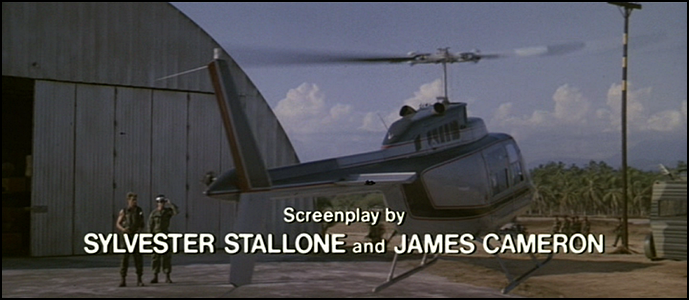
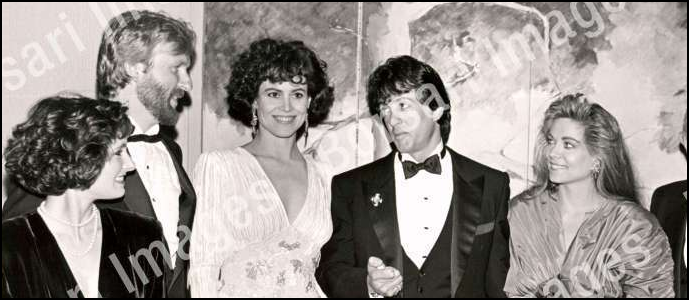
Photo courtesy of Borsariimages.com
During the early 1980s, James Cameron wrote three screenplays simultaneously: The Terminator, Aliens, and the first draft of Rambo: First Blood Part II. While Cameron would continue with The Terminator and with Aliens, Sylvester Stallone eventually took over the script of Rambo: First Blood Part II, creating a final draft which differed radically from Cameron's initial version. Cameron was credited for his screenplay in the film's final credits. He wrote quite an interesting screenplay which featured more depth than the first Rambo movie had had. He also wrote in a sidekick to Rambo in order to make the screenplay more character driven. However Sylvester Stallone, as he always does, rewrote the screenplay to fit his needs. Most of what Cameron had written was left out. Also, his original screenplay began with Col. Trautman finding Rambo in a psychiatric hospital instead of a prison. When Cameron went to see the movie he felt odd. His only comfort was the fact that the crowd cheered at the those action sequences he recognized as his own.
James Cameron, Monsterland #13 October 1986 : "It was quite a different film from FIRST BLOOD, apart from the continuation of the Rambo character. The first one was set in a small town, it had a different social consciousness from the second one, which was a very broad, stylized adventure. It was a little more violent in its execution than I had in mind in the writing"
"I admire the film's success and I'm happy for everybody involved, but I always have to distance myself from it because it's not the film I wrote – it was substantially rewritten by Sylvester Stallone. The script that I wrote was pretty violent, but not in such an amoral way. (...) I know very little about Stallone, because my work with him consisted of one lunch to discuss the script. He said, "I think you should put a girl in it."" - Us Interview '91
Galactic Journal 1986: (Rambo First Blood Part II) was eventually altered by its star in order to accommodate his rightwing vision of the Vietnam conflict. Cameron's story focused more on the character and the dilemmas he had to face as a man who has been shattered by war. While Cameron does not want to totally disassociate himself from 'Rambo', he does find the ending of the Stallone vehicle "breathtaking in its stupidity" "
James Cameron: "(Rambo II) was written at a point when I had no money and was waiting to start shooting T1. Basically I did it as a writing assignment to stay alive for six months. To be honest I did that project because I felt First Blood was a pretty good film. It walked a fine line - Rambo doesn't kill anybody, but he disassembles almost an entire National Guard unit with snares and slings, relying on cunning and ingenuity to outsmart them. The second film, the one I wrote, was by its nature a little more violent because Rambo was going into enemy territory, but I tried to walk the same line. He didn't go out of his way to slaughter people just because they were wearing wrong uniform. A lot of moral distinctions I tried to build into the script got carved away during the shoot. I didn't want to attach myself to that film in a strong way because the end result didn't represent what I wrote. It taught me the danger of writing something over which I'd have no control once it was done, and I won't do that again" (On Production magazine 1992)
Rambo: First Blood Part II (also known as Rambo II or First Blood Part II in other countries), released on May 22, 1985, is the second movie in the Rambo series, starring Sylvester Stallone as Vietnam veteran John Rambo. Picking up where the first film left off, this sequel is set in the context of the Vietnam War POW/MIA issue; it sees Rambo released from prison by Federal order to document the possible existence of POWs in Vietnam, under the belief that he will find nothing, thus enabling the government to sweep the issue under the rug.
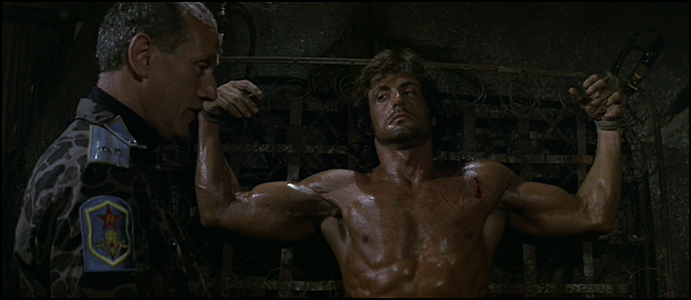
One of only two scenes that made it from Cameron's script
James Cameron, 1986's Starlog magazine:
"After Rambo, I'm not that
interested in making a film where people are running around shooting each other,
and getting into the moral complications of saying 'Well, just because they're
wearing a different uniform from another country, its OK, in order to feel
absolutely lily-white and clean about the havoc that's wrought on their bodies
by high velocity ballistic weapons"
The movie, which had a
then-enormous budget of $44 million, became a box-office success. Earning just
over $150 million in North America and just under that amount in the rest of the
world, it was the second most successful movie of 1985 in North America, behind
Back to the Future and just ahead of Rocky IV, giving Stallone two of three top
grossing movies of that year. This film captured the attention of President
Ronald Reagan and he lauded Stallone for portraying Rambo as a symbol of the
U.S. Army. Between the success of Rambo and Rocky, Stallone became not
only one of favorites for the R rated action audience, but at the same time a
hero of many high school and middle school boys in the 80's. Almost 30 years later, Rambo is still a household
name.
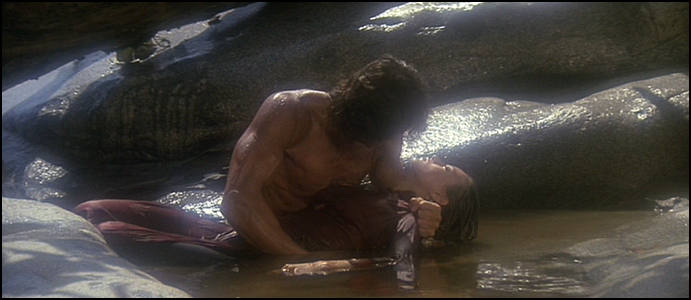
Above, the second of two scenes that made it into the movie from Cameron's script, but even so, heavily simplified.
The dialogue as it appears in the movie:
CO
what you do now, trying to get across to Thailand?
RAMBO
Yeah
CO
Then go America?
RAMBO
Yeah
CO
You take me with you?
*Kiss
CO
You take me?
RAMBO
Yeah
CO
I think you made good choice
RAMBO
Yeah
CO
We go?
RAMBO
Let's go
The same dialogue as it appears in Cameron's script:
CO
You try get across Laos? Get to
Thailand?
RAMBO
(nodding)
Yeah. Got some business there.
What are you gonna do?
CO
(shrugs)
Go United States. See Nguyen.
Maybe teach economics. Buy
Cadillac. Watch "Dynasty."
RAMBO
How you going to get there? You
can't trust the spooks to pull you
out. They'll use you up and throw
you away.
CO
I know. I go with you.
RAMBO
I couldn't get you in.
Co stops her work and replies very quietly.
CO
Yes you can.
RAMBO
How?
Co's gaze holds his and her Cheshire grin flickers.
CO
As wife.
Rambo realizes she is serious. The silence drags when he
realizes how good that sounds to him at this moment. And
how small a price that is to repay her.
RAMBO
(with finality)
Okay. Done. You got it.
She seems a bit shocked, then smiles impishly.
CO
You too easy.
Co's hands have been all over him but only now does he
become aware of them on his shoulders.
She draws her face up to his but Rambo pulls back from the
kiss. Co looks puzzled as he slowly disengages from her
contact.
CO
You don't feel love, Rambo?
He leans back against the wall.
RAMBO
Look, Co...
CO
Why you don't feel love? Not
allowed?
(her tone becomes
aggressive)
Dead inside, maybe? You make
yourself dead already so they can't
kill you? In-vulnerabo? Bullshit!
She advances on him until her face is close to his, her
words finding their mark.
CO
(continuing)
Bucu bullshit!
(pause)
I have enough death already.
Husband. Mother. Father.
Brothers. Death everywhere.
She points into the undergrowth nearby, to a ghostly
blossom growing there among the tangled vines.
CO
You see? A flower like that need
good soil to grow. Many time under
earth is bones of animal... or
person. Killed in jungle. Make
soil rich. Grows most beautiful
flower. You call orchid. Many
deaths in jungle. Vietnamese, V.C.,
American. Many beautiful flowers.
CO
(terrified)
What was that?
RAMBO
Minigun. Come on. Let's move.
He's coming in on our open side.
And the death scene dialogue from the movie
[quote]CO
Rambo?
RAMBO
Yeah, yeah?
CO
You... wont.... forget... me?
RAMBO
No, no....no
And Cameron's dialogue:
CO
(almost inaudible)
Dinky-dau-Rambo.
Rambo is rocking her, willing the life to stay in her, his
expression anguished.
RAMBO
John. My name is John.
CO
(very weak)
It doesn't hurt. Why doesn't it
hurt?
RAMBO
... you're gonna love it there.
It'll be great. We can do what we
want... you and me... go to the
beach... with Nguyen... watch him
ridin' his surfboard...
Co's eyes are glazed, half-open. She is gone.
Rambo sobs. Somehow this one tragedy renders all the
others pale.
RAMBO
(continuing)
Oh, God...
He kisses her mouth fiercely. Trying to make her live, to
infuse her cooling flesh with some of his vast will.
While the movie was a
commercial success particularly with young male fans of
action films, it was reviled by critics. The film also had an impact on the
cultural landscape of the 1980s. When the film was released, the "political"
content of the movie was considered controversial. Many felt the Vietnam
conflict was "altered" to look and sound heroic. A newly-coined word
"Rambo-ism" became a descriptive of such a mentality. Cameron
commented that he only wrote the "action" and that Stallone wrote the
"politics". 1986' TIME Magazine wasn't complimentary of the movie
either: (James Cameron) finished the script on which Sylvester Stallone did
his usual devastating rewrite.

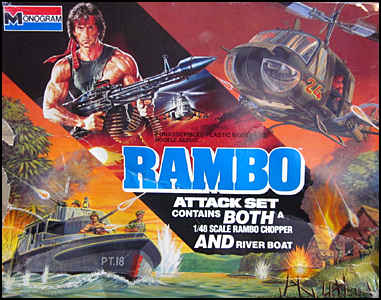
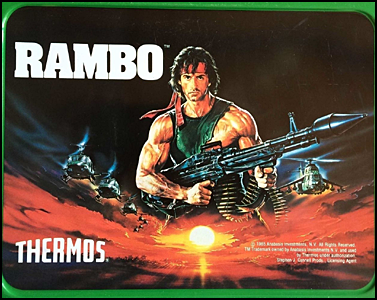
James Cameron, '86 TIME: "I recognize parts of it", Cameron says manfully, but adds, " I was trying to create a semi-realistic, haunted character, the quintessential Vietnam returnee, not a political statement".
"One of the things that interested me is that there are a lot of soldiers from Vietnam, who have been in intense combat situations, who re-enlisted to go back again. Because they had these psychological problems that they had to work out. It's like an inner demon to be exorcised. I did a bit of that in Rambo, but it didn't get used." - Lofficier.com:
"Well, I came rather late to that. I actually thought the first one was a
pretty good film. That's what attracted me to the second one, the underdog
story. I was kind of fascinated by Vietnam at that point and what a weird and
surreal kind of war that was. So my approach to it was a lot heavier, a lot more
character. I just ran into Sly (Stallone) recently, and he was saying that when
he looks back on it -although he doesn't have any regrets, in a way he wished he
could have done the script that I wrote because they did wind up throwing out
about the first half of it. They kept a lot of the action. They just kind of
made it a "Mission Impossible" thing -for me it took on kind of a superhero-type
quality. I thought it was much more interesting to kind of explore this
traumatized character. Maybe I'll get to use that stuff somewhere else. I used a
bit of it in "Aliens," having them come back from something they were
traumatized by. There was a bit of that delayed stress syndrome stuff in
"Aliens" they didn't use in "Rambo II." - Hollywood Reporter 1986:
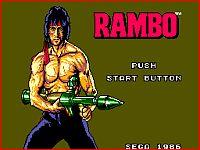
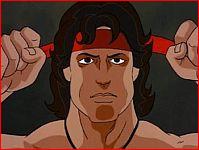 Rambo:
First Blood Part II was directed by George P. Cosmatos, who later directed
the movie Cobra with Sylvester Stallone and Brigitte Nielsen
Rambo:
First Blood Part II was directed by George P. Cosmatos, who later directed
the movie Cobra with Sylvester Stallone and Brigitte Nielsen
Either way, the movie was the most successful of the franchise, and also the only one that got an Academy Award nomination.
The movie also kickstarted the franchise and made it a household name, with video games and countless merchandise following, as well as an Animated series in 1986.
Read the original James Cameron's script for Rambo II: The Mission HERE
RAMBO FIRST BLOOD PART II
Carolco 1985
Director: George P. Cosmatos
Writers: Sylvester Stallone and
James Cameron
Actors: Sylvester Stallone, Richard Crenna, Steven Berkoff, Julia Nickson-Soul
Producers: Buzz Feitshans, Mario Kassar, Andrew Vajna
Composer: Jerry Goldsmith
Release Date: May 22, 1985
Running Time: 94 min.
MPAA Rating: R Production Budget: $44,000,000
BOX OFFICE
Opening Weekend: $20,176,217
Domestic Gross: $150,415,432
Foreign: $149,985,000
Worldwide: $300,400,432